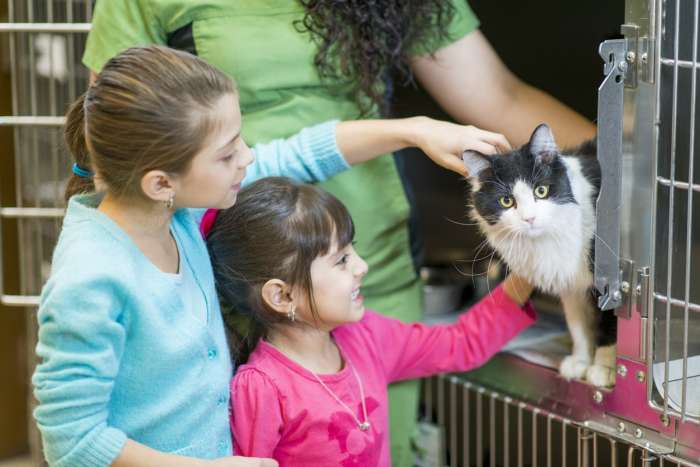Cats make great family pets. They’re playful, interactive, and pretty low maintenance as far as pets go. So, where do you go to find your new furry family member?
Where to Adopt or Buy Cats
Most of us are familiar with the slogan, “Adopt, don’t shop.” This slogan goes back to a time when the main choices for prospective pet owners were buying from a pet shop or breeder, or adopting from a shelter.
Fortunately, there are a lot more possibilities now if you’re looking to get a cat for you or your kids.
Pet Stores
In the past, pet stores developed a bad reputation, as many sourced their animals from backyard breeders and pet mills. The breeding animals were often bred and kept under inhumane conditions, and their offspring were often sickly.
However, today, some pet stores partner with rescue organizations for pet adoption events, or even to offer rescue animals on a regular basis. If your local pet store has rescue animals or hosts rescue events, this could be a great place to find your new furry friend.
Shelters
Your local animal shelter is also a good place to adopt a new pet. Adopting from a kill shelter is literally saving a life, and adopting from no-kill animal shelters means that you’ll be freeing up safe space for another animal in need.
Are You Married to Your Work or to Your Spouse?
Some people are fortunate enough to really love their work. They put tons of energy into their job and receive a lot of personal satisfaction from the results. They tend to work long hours and talk enthusiastically about their job to whomever will listen. Most of their friends tend to be from the office. Read More
Cat Rescues
Cat rescues have higher adoption fees than shelters, but rescue groups often provide services like vaccinations, microchipping, deworming, spaying and neutering, and socialization when needed.
Plus, if you need to find a new home for your cat, a rescue can often help place your cat, so it doesn’t get abandoned or put in a shelter.
There are even breed-specific rescues for people looking for a specific breed, such as Siamese, Ragdoll, Bengal, or Persian.
Responsible Breeders
Responsible breeders keep their animals under humane conditions and under regular veterinary supervision. Many will also insist that you bring your pet back to them if you’re unable to keep it.
You can find a responsible breeder at Responsible Pet Breeders.com. Your vet may also have recommendations.
Community Sources
If you’re looking to adopt a cat, let the people in your community know. You never know when someone may need to find a new home for their cat. Your vet may also know of someone who has had a recent litter of kittens, or who needs to rehome their cat.
How Much Does it Cost to Buy a Cat?
That depends on a lot of things.
Purebred cats can cost hundreds, or even thousands of dollars, while a shelter cat will cost much less.
Some shelters will waive adoption fees under certain circumstances, for example, if the shelter is overcrowded. Some shelters will also offer reduced adoption fees for certain types of animals or adopters. Check with your local shelter for details.

How to Search for Cats Online
Online sales sites often have ads from backyard (amateur) breeders and kitten mills. Animals from these sources are often bred and kept in unhygienic and inhumane conditions. The animals may be sick, malnourished, or riddled with parasites. And pet sales scams abound (Humane Society, 2023).
However, some online sources are a reliable way to connect animals needing a home with people looking for a new family member. These include:
- Petfinder.com: A national database for animal rescues and shelters. They have some great pet care tips, too!
- ASPCA.org: A free resource that lets you search for adoptable shelter animals near you.
These sites allow you to search for animals in your area who meet your needs, such as age, breed, ability to live with other animals, and more.
What Kind of Cat is Right for Your Family?
Some people are interested in specific breeds. But a regular old “domestic shorthair” can be as good a pet as a purebred cat. If you want a specific breed, then consult with a reputable breeder or breed-specific rescue. Otherwise, think about the characteristics that would make a cat a good fit for your home.
Personality
When it comes to choosing a family pet, the cat’s personality is more important than its appearance. Like people, cats have different personalities. Some are quiet, some are outgoing, some are cuddly, while others prefer to keep their distance.
Many shelters and rescues will allow you to visit with a cat that you’re considering, in order to observe its personality. Remember that most cats will be shy with people they don’t know, and may even hide when they first come home. This is normal. Allow your cat to set the pace, and they will emerge in their own time.
Age
When a lot of people think about bringing home a cat, they think about a cute kitten. Kittens are great! They’re playful and can adapt easily to different circumstances. But older cats have a lot to offer, too, and are often overlooked.
Adult cats have distinct personalities, which can be delightful to discover. They also “know the ropes” when it comes to living with people. They understand what a litter-box is for, and may be less likely to shred the furniture, climb the curtains, or engage in other undesirable juvenile behaviors.
Questions to Ask BEFORE Adopting a Cat
Is your family ready for a cat? And is a cat the right pet for you?
A cat isn’t a toy to discard when you’re bored with it or don’t want to take care of it anymore. Are you ready to bring home a new family member and care for it for the next 13 to 17 years? If not, then you may want to wait.
Is a Cat the Right Pet for You?
Cats are fluffy and may look like they want a cuddle. Many do like to cuddle but on their own terms. People who pick up a cat when it’s not expecting it, or when it doesn’t want to be picked up, may experience a scratch or bite.
Side note: cat bites that break the skin are serious, and always require a trip to the doctor to prevent cat scratch fever or other infection issues. (Cafasso, 2021).
If your family has children under five, it may be best to wait before adding a cat. And it’s important that human family members of all ages understand a bit about how cats behave (Gould, 2023) and communicate (Gerkin, 2023) — because it can be quite different from how humans do it!

Will You Have an Outdoor or Indoor Cat?
Opinions vary widely on whether cats should be indoor-only pets or allowed outdoors. And individual cats will have their own preferences, too. If you choose to allow your cat outdoors, be aware of the dangers they may encounter in your area.
- Predators like coyotes, hawks, foxes, raccoons, and dogs
- Busy streets
- Weather extremes
- Parasites and diseases
And if you choose to keep your cat indoors, be prepared to provide a lot of interaction, entertainment, and exercise to stave off boredom (which can cause behavioral problems) and obesity.
Do you Have Enough Money for Veterinary Care?
Pet care is expensive. Your initial expenses may include spay/neuter, vaccinations, and microchipping. You may also need deworming and flea and tick control on a regular basis.
In addition, injuries and illnesses can happen even to the best cared-for pets. And these can run into thousands of dollars.
Veterinary insurance is one solution — it’s health insurance for your pet. But monthly payments often increase as your pet ages and can go up sharply every time you use the insurance.
Some vets offer care plans, which provide routine services and discounted prices on other services for a small monthly fee that stays the same. Another solution is to budget each month for pet care, putting aside money for unexpected expenses.
Are You Allowed Pets in Your Apartment or Home?
If you’re renting, review your rental agreement to make sure that pets are allowed. And if you have a neighborhood association, make sure that any new pets will be welcome under your agreement.
It’s also important that all household members agree to a pet, and that a responsible adult will be in charge of care.
How Will a Cat Adjust to Other People and Pets?
Do you have other pets? If so, will a cat fit in well with them?
Cats are predators, and can be a menace to small pets like birds, hamsters, gerbils, mice, rats, rabbits, and guinea pigs — even fish!
Some dogs get along fine with cats, while others may chase or even harm them.
And while many cats can get along with other cats in the home, they will need to be introduced carefully, and there may be a period of fighting before they accept one another (Wildman, 2023).
What Happens if You Can’t Care for Your Cat?
If your family’s circumstances change, and you can’t keep your cat, what will you do?
Remember, a cat is a family member. They love you and will miss you. If you do have to give up your cat, the best solution is a happy home with someone you know. Veterinarians in your area may know someone looking for a new pet. Cat rescues and no-kill shelters can also offer your cat a chance.
Never, under any circumstances, offer your cat as “free to a good home,” as these pets often meet with unhappy ends.
Questions to Ask When Buying or Adopting a Cat
Make a list of questions to ask before buying or adopting a cat. Here are a few to get you started.
-
How Old is the Kitten/Cat?
Experts say that kittens should not be adopted before eight weeks of age. Responsible breeders often keep kittens until 12 to 16 weeks of age. This allows the kitten’s immune system to develop, and it will also be old enough to be vaccinated and spayed or neutered.
If you’re adopting an adult cat, knowing its age will give you an idea about what to expect in terms of behavior and potential health issues.
-
Has the Kitten Been Kept With Its Mother?
Keeping a kitten with its mother until adoption time has many advantages:
- Mother’s milk contains antibodies that will strengthen the kitten’s immune system
- Kittens allowed to stay with their mothers will be happier and more secure (and less prone to behavioral issues)
- Mother cats teach their kittens manners and normal behavior
3. Will You Show Me My Cat’s Health Records?
Veterinary records show that the cat has been properly cared for. They will also tell you of any vaccinations the cat may have had, or of any existing health issues.
4. If I Can’t Keep the Cat, Will the Shelter Take it Back?
Many rescues prefer to take a cat back if you can’t keep it. Many responsible breeders will take a cat back, as well.

Cat Adoption Checklist
Do you have what your cat will need to make itself at home? Here are a few things to have on hand.
Cat Food
Should you feed dry food or wet food?
A cat can exist on dry food alone, and dry food is best for cats’ teeth. However, cats are obligate carnivores. This means that they need to eat meat to survive. Wet food can provide that meat, but wet food alone can lead to gingivitis and tooth rot.
So give your cat a bit of both.
Litter Box and Scoop
Cats are naturally clean, and most adults will “do their business” in a litterbox without being taught. Kittens are easy to litter train (Lovejoy, 2020). Have a litterbox set up before your cat comes home, and be prepared to clean it out several times a week.
Cat Litter
There are a variety of cat litter on the market. Avoid litters with fragrances or additional chemicals. Dust-free litters are best for your cat’s lungs.
And if you have a dog, be aware that some dogs enjoy a “snack” from the litterbox (disgusting but quite common). Clumping cat litter can cause painful and potentially deadly bowel obstructions, so choose a non-clumping litter made from paper or wood pellets.
Veterinarian
Choose a veterinarian before you bring your cat home. That way, if you need a vet unexpectedly, you won’t have to search for one while your pet is suffering.
Bringing Home Your New Family Cat!
A cat can be an excellent addition to the family. Increase the chances of a happy ending by making sure that your family is prepared, by sourcing your cat from a responsible party, and by making your home cat-ready before you bring your new pet home.



